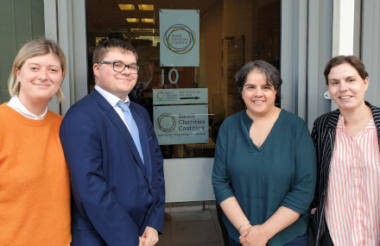“This is possibly one of the most exciting and most challenging posts that I have come across”, says Rita Chadha. Chadha joined the Small Charities Coalition (SCC) as full-time chief executive in September, having already taken over the role on a part-time basis a few months prior.
She has worked for a variety of small charities throughout her career, including being interim chief executive at Broxbourne Citizens Advice and director at the Migrants’ Rights Network. Since starting her latest role she says there has been “never a dull moment” and that there has been “a deluge of goodwill”.
“I applied because I have got a background in campaigning,” explains Chadha. “I have always done equalities work or championed the underdog, and to my mind, small charities are very much the underdog in the charity sector at the moment”.
“What has surprised me is how small SCC is as an organisation itself to be covering such a broad national remit”.
The SCC has a membership of around 10,000 and adds around 20 new members a week. But it plans to increase the sign-up rate and by this time next year be adding 50 to 100 new members a week. It also wants to be able to offer a mentor for any member organisation in any part of England and Wales.
The new strategy: A three-pronged approach
Chadha is introducing a new strategy involving a focus on three key areas. It will be “fully in place for April” although the SCC team has begun to implement aspects of it already.
This first area involves “redefining our remit”. Currently, the SCC helps charities with incomes up to £1m, but it will now be concentrating on charities between £0 and £350,000. “We want to focus on those that have the least at the moment and are just starting out. But also those smaller charities that are doing some excellent, really focused work that are struggling to be heard”.
Secondly, the strategy will focus on expanding across the UK by “making sure we go outside of London.” Chadha says that there has been “an organic demand” in areas outside of the capital. For example, “we have started by doing quite a bit of work in the North East and that is an area we are looking to expand,” she says.
Thirdly, SCC will be “creating a roar”. Now at the helm, Chadha will be “amplifying the voice for small charities”. She says: “What we would like to do is go back to the original thinking when this organisation was set up, where the intention was that every small charity would then help another small charity. I think over time that has become very difficult to administer.
“But we think that we can get the ethos and the spirit of that by actually trying to create what we call a small charities movement. So, regardless of where you are in the country, or what you are doing, or what specific area you are working in, you can feel some unity by the fact that you are small and that you are not for profit.”
Chadha suggests that “we don’t understand charities well enough in the UK”, and that the Charity Commission does not have a full understanding of the issues that small organisations face. Chadha also suggests that the regulator's tone can intimidate small charities.
‘My challenge to Helen Stephenson - come and do my job for a day’
Chadha argues that the Commission’s stance on public trust is “totally and utterly developed from a political viewpoint”. She says that its reports are not reflective of the overall public perception of small charities, and that there is a political agenda in this regulatory voice. “I would totally dispute every single one of the Commission's reports and studies where it says there is a lack of trust in charities”. She adds that it is “in the government’s interest not to have strong charities and I think that is part of a plan”.
She says that the “real challenge for the regulator” is “to keep up to date with the speed and with the needs of small charities”, which is something she does not think “they are even fully aware of at the moment”.
Chadha thinks that a “regulator which is more benevolent than an enforcer would be really helpful”, and that the Commission should focus on “improving their guidance, making it more accessible, streamlining and making their own systems more transparent”, which she says the SCC are happy to work with them on.
“I think it would be interesting to see the Charity Commission come and run a small charity for the day, that would be my challenge. My challenge to Helen Stephenson - come and do my job for a day - let’s do a job swap.” She adds: “I am sure her job is not easy either, but I do not think they understand the day-to-day reality of a small charity”.
Campaigning: ‘The guidance is so vague and has been so unclear’
Chadha was one of the sector leaders to call on the next government to provide greater freedom for civil society campaigning. She says there has been a “subtle pressure” on small charities, which have come to fear campaigning”.
“I think small charities have felt intimidated, have felt closed off to campaigning, because of the big scare stories around the Lobbying Act. They have felt heavily regulated, or pressurised even, by the Commission to perform in certain ways. Because the guidance is so vague and has been so unclear, that's allowed for ambiguity to drift in.
“For smaller charities which are so focused on change in a locality or change in a very specific sphere of work, they can't really measure their success unless they achieve that change, and often you can't achieve that change without legislative change behind that as well. So if you can't talk to your councillors or your politicians then actually, you are doing your own beneficiaries a disservice,” she explains.
Nonetheless, Chadha says the SCC does not hear much from small charities on Brexit. “The way that the government has framed all the stuff around charities and Brexit is very much around readiness and being prepared to deal with the aftermath. I think people mostly take that as a fait accompli - it will happen at some point but we will deal with it at some point when it happens”.
She adds: “Once it is in front of them they will deal with it, but at this point why as a small charity with such limited resources would you waste your money on an abstract notion”.
Brexit will, however, have a significant impact on charities. “It is those practical consequences that affect smaller charities more,” says Chadha.
Diversity: ‘Larger charities could really learn from smaller charities’
Chadha suggests that “diversity works very differently in the small charity sector”, as small charities are “born from communities that are diverse because they have grown organically”. They “have responded to a need” so it is “whoever has been in the room - and that has been their primary driver”. She thinks “this is a place where larger charities could really learn from smaller charities”, but says “there is always more we could do, we cannot afford to be complacent”.
In Chadha’s own experience, “we tend to look at diversity in a very negative context in the charity sector”, as it is “very much from a deficit model”. But actually “we have not looked at where the diversity is in smaller charities”.
“I was appointed a week after the announcement was made on the new chief executive at NCVO and he [Karl Wilding] got a lot of criticism for being a white male, but I got no praise for being an Asian woman. Why is it we always look for the bad in diversity, we do not celebrate the good?”
Infrastructure bodies: ‘We aren't the sexy parts of the voluntary sector’
Chadha says there have been “progressive overtures” from infrastructure bodies and that she has been welcomed in her role. “I’ve got to say one of the things that has surprised me is how friendly everybody has been in the infrastructure world, I hadn’t expected the kind of level of warmth that I have received,” she says.
She suggests that “people are genuinely up for collaboration”, and that this is part of the SCC changing its remit down to £350,000. As charities grow they might be referred to other membership bodies who can offer more appropriate resources, and “we should applaud that, we shouldn’t discourage it,” she says.
Nonetheless, Chadha thinks infrastructure organisations “are all encumbered by is the logistics”, because “you can't just set up a partnership and not resource it”.
She also says that becoming chief executive of the SCC has shown her the nuances of the infrastructure world. “Where I have been a service user of infrastructure bodies previously, I have often wondered: ‘Don't you all do the same thing’ and ‘aren't you duplicating’? When you see it from this side you do see the nuances and see the different focuses; whether that is geographically or thematically, and that is not always easy to communicate.”
Chadha thinks the challenge is that infrastructure bodies are not well understood. She says: “We aren’t cuddly, we aren't the sexy parts of the voluntary sector. We are the invisible bits that keep everybody else going.”
|
Related Articles












